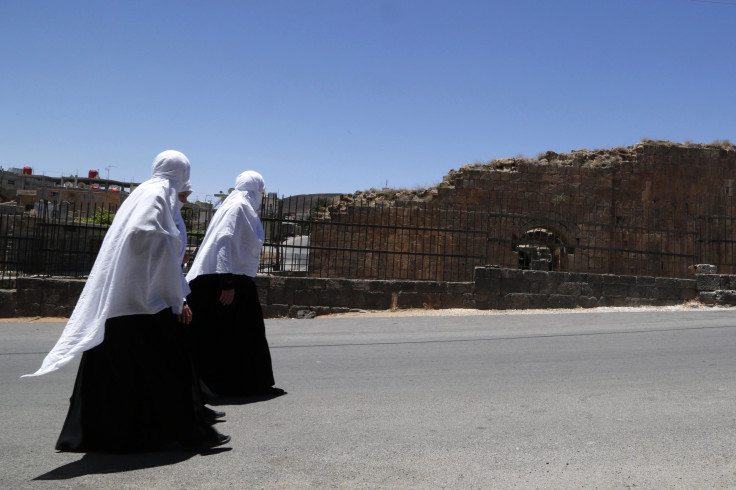Who Are The Druze? Minority Sect In Peril After Syrian Al Qaeda Branch Slaughters Villagers

Al Qaeda-linked militants massacred at least 20 residents of a Druze village in Syria’s northwestern Idlib province on Wednesday, in the first mass violence directed at the religious minority since the start of the Syrian civil war in 2011. The incident has underscored the challenge faced by the carefully neutral Druze community amid intensifying sectarianism in the region.
Extremist Sunnis like the Nusra Front, the militant group responsible for Wednesday’s massacre in the village of Qalb Lawzah, view the Druze as apostates from their version of Islam. While the Druze faith is typically characterized as a 10th-century offshoot of Shiite Islam, the religion developed independently from Islam and incorporates teachings from various other and older traditions, including Greek and Vedic elements.
Of the roughly 1.5 million Druze around the world, the majority live in Lebanon, Israel and Syria, where they made up about 3 percent of the country’s 22.5 million population prior to the beginning of the uprising against the regime of President Bashar Assad in 2011.
The religious minority has been able to sustain itself for nearly a thousand years in the region despite waves of persecution, largely by keeping a distance from politics. Up until this week, that was also the case with the Syrian conflict. Syrian Druze have avoided engaging in the hostilities that have raged between supporters of the regime and Sunni rebels, only taking up arms to defend their villages.
The Qalb Lawzah massacre might change that calculus for some Druze, however. A prominent Lebanese Druze party chief and former government minister is now urging the Druze to form an armed force to defend their community. “We will not accept to sell Druze blood!” said Wiam Wahhab, in an angry televised speech, Beirut’s Daily Star reported. “[The Druze in Syria] are ready to defeat the terrorists, but what they lack is arms. Lebanon’s Druze are ready to help, we are ready to form an army of 200,000 fighters to defend the Druze.”
But Lebanon’s most influential Druze leader, Walid Jumblatt, rejected the idea, calling instead for an emergency meeting of a Druze religious council on Friday. “Any inciting rhetoric will not be beneficial,” Jumblatt wrote on Twitter.
The Druze spiritual leader in Syria echoed Wahhab’s call, however, urging Druze to join the Syrian regime's army. Within Syria, Assad has received broad, if quiet, support from the minority faith, which, like his own Alawite minority group and the Christians, has felt threatened by the insurgency. Among the most prominent and threatening of these opposition forces are militant Sunni Islamist groups like the Islamic State and the Nusra Front.
Many Druze in Syria live in the southern province of Suweida, which is currently in the crosshairs of advancing Islamist fighters. The advance has raised the possibility of yet another group getting drawn into the conflict which has left an estimated 250,000 people dead and millions of others displaced.
© Copyright IBTimes 2025. All rights reserved.






















